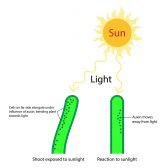sequester
1. To separate from the owner for a time; to take from parties in controversy and put into the possession of an indifferent person; to seize or take possession of, as property belonging to another, and hold it till the profits have paid the demand for which it is taken, or till the owner has performed the decree of court, or clears himself of contempt; in international law, to confiscate. Formerly the goods of a defendant in chancery were, in the last resort, sequestered and detained to enforce the decrees of the court. And now the profits of a benefice are sequestered to pay the debts of ecclesiastics. (Blackstone)
2. To cause (one) to submit to the process of sequestration; to deprive (one) of one’s estate, property, etc. It was his tailor and his cook, his fine fashions and his french ragouts, which sequestered him. (south)
3. To set apart; to put aside; to remove; to separate from other things. I had wholly sequestered my civil affairss. (bacon)
4. To cause to retire or withdraw into obscurity; to seclude; to withdraw; often used reflexively. When men most sequester themselves from action. (hooker) A love and desire to sequester a man’s self for a higher conversation. (bacon) 5. (Chem) To bind, so as to make metal ion unavailable in its normal form; said of chelating agents, such as eDTA, which, in a solution, bind tightly to multivalent metal cations, thereby lowering their effective concentration in solution. Compounds employed particu
a48
larly for this purpose are called sequestering agents, or chelating agents. In biochemistry, sequestration is one means of reversibly inhibiting enzymes which depend on divalent metal cations (such as magnesium) for their activity. Such agents are used, for example, to help preserve blood for storage and subsequent use in transfusion.
1. Sequestration; separation.
2. A person with whom two or more contending parties deposit the subject matter of the controversy; one who mediates between two parties; a mediator; an umpire or referee.
3. (Science: medicine) same as sequestrum.
Origin: F. Sequestrer, L. Sequestrare to give up for safe keeping, from sequester a depositary or trustee in whose hands the thing contested was placed until the dispute was settled. Cf. Sequestrate.
Dictionary > Sequester
You will also like...

Types and Causes of Brain Damage
This tutorial describes the different types and causes of brain damage. Find out how genetics, physical injury, lack of ..

The Gene Pool and Population Genetics
According to Charles Darwin's theory of natural selection, preferable genes are favored by nature in the gene pool, and ..

Plant Auxins – Phototropism & Geotropism
Plants produce hormones to regulate their growth. Auxins, for instance, influence plant growth. Know the role of auxin i..

Protein Synthesis
Part of the genetic information is devoted to the synthesis of proteins. mRNA, a type of RNA, is produced as a transcri..

New Zealand’s Unique Fauna
Meet some of New Zealand's unique fauna, including endemic insects, frogs, reptiles, birds, and mammals, and investigate..

Freshwater Lentic Communities & Animals
This tutorial looks at some of the communities in freshwater lentic habitats. For instance, symbiosis occurs in a commun..

